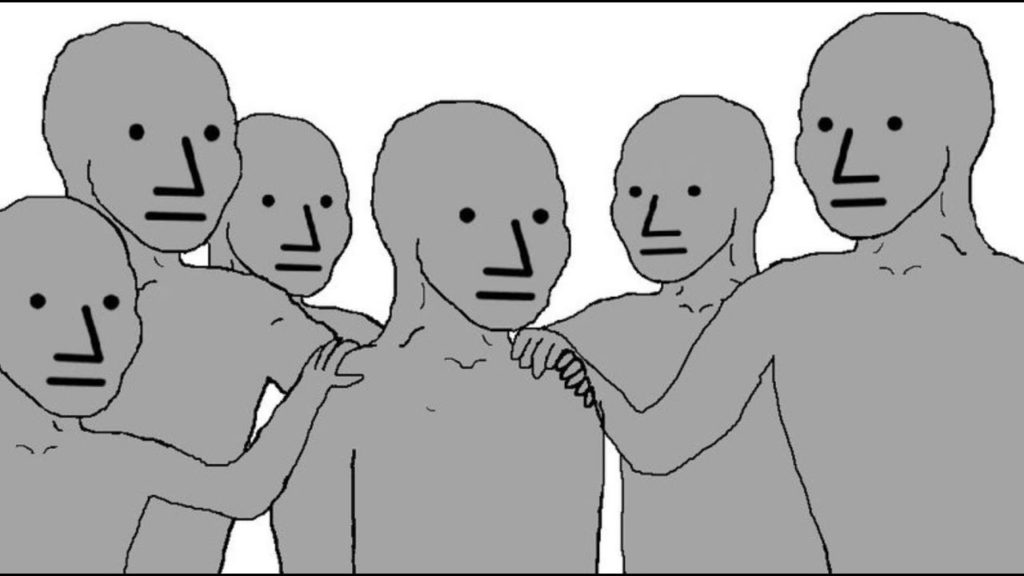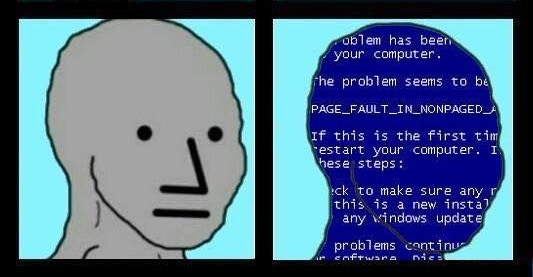
His eyes are black dots peering lifelessly out from a pallid grey face. His nose is nothing more than a triangle; his mouth is nothing more than a straight line. Hairless on crown, hairless on face, he casts a ghoulish and nightmarish figure. He is the Great NPC, one of the Younger Gods of the Clown World pantheon.
NPC stands for Non-Player Character. It’s originally a Dungeons and Dragons term, and it refers to characters who are played by the Dungeon Master and not by one of of the other players (who play PCs, or Player Characters). With the rise of video gaming, NPC came to refer to a game character that was controlled by the computer.
In either case, NPC came to be understood as a metaphor for an apparently human being that had no mind of its own. The main characteristic of NPC behaviour is that it is extremely predictable. Having no mind of their own, NPCs don’t have motivations, intentions or aspirations above that which their controllers imbue them with. They are every bit the programmable machine.
An NPC has been so completely programmed – whether by the television, by their schooling, by their religious indoctrination or by peer pressure – that they have no original ideas of their own. Everything they say, and everything they think, is simply repetition of something they had been programmed to believe.
The NPC can never question the mainstream narrative. They are incapable of making their own truth judgments. Any time they are asked a question, they respond with what the herd thinks. If the herd wants to zig, then the NPC will say that it’s time to zig. If the herd wants to zag, then they will say that it’s time to zag.
Being so dumb, the NPC is prone to paralysing bouts of cognitive dissonance, something which is heavily mocked by Clown World denizens in meme form. At maximum intensity, this cognitive dissonance can cause the NPC to suffer an NPC Error, which is when the NPC’s central processing unit is overwhelmed by the demands placed on it and crashes.

Encountering an NPC can be a terrifying experience if one isn’t used to it, akin to encountering a zombie or something else that isn’t human. Like a Terminator, one can never be sure that they’re not about to turn on you, pitilessly tearing you apart for a reason only their controller understands. Not being in possession of a soul, the NPC cannot be in possession of empathy.
Fortunately, NPCs are harmless in most cases, at least when it comes to direct violence. The real danger is that their mindless repetition of programming can lead to the normalisation of inaccurate ideas, which can lead to harmful consequences. If the television can program enough NPCs to believe something, the dead mass of their bleating will penetrate into every corner of society, causing everyone else to believe that thing too. If that belief is wrong, people will suffer.
It isn’t easy to tell if any given person one encounters is an NPC (as has been discussed at length here, determining an NPC from a conscious person is far from straightforward). So it’s usually necessary to rely on one’s intuitive sense of whether there’s anyone home. An NPC can say any number of things that hint at deep thought and intelligence. But all of it is mere programming.
The number of NPCs in the world appears to be growing larger. One of the characteristic phenomena of Clown World is that the divine spark within us all has begun to weaken. If this spark weakens enough, a person no longer has the will to do good things in the world. At this point, they will simply drift through life on the waves of social fashions. If uninspired by the divine, Wojak falls down the Fundamental Axis, and declines into an NPC.
All NPCs are avatars of the Great NPC himself, the Younger God of the Negative Pole of the Fundamental Axis. He is a reminder of what can happen to Wojak if he falls under the influence of the Merchant. The Great NPC hates all freethinking and all questioning of dogma. If the Merchant is the owner of the Clown World plantation, the Great NPC is its overseer.
The Great NPC is the god that represents the power of the mindless masses. His ultimate goal is to turn the entire world into NPCs. The reason why NPCs get angry when conscious people disagree with them is because the NPCs are trying to intimidate those people into silence. The Great NPC wants the entire world marching to a single drummer, too afraid to break step.
In this sense, the Great NPC is fundamentally opposed to Pepe, the Younger God of the Positive Pole of the Fundamental Axis. Pepe’s role in Clown World is to break down the cancer with spontaneous humour and good cheer. His meme magic is the antidote to NPC thinking, because NPC’s can’t understand it. Much of the cultural warfare in Clown World boils down to shitposters loyal to Pepe taking on normieposters loyal to the Great NPC.
*
This article is an excerpt from Clown World Chronicles, a book about the insanity of life in the post-Industrial West. This is being compiled by Vince McLeod for an expected release in the middle of 2020.
*
If you enjoyed reading this essay, you can get a compilation of the Best VJMP Essays and Articles of 2019 from Amazon for Kindle or Amazon for CreateSpace (for international readers), or TradeMe (for Kiwis). A compilation of the Best VJMP Essays and Articles of 2018 and the Best VJMP Essays and Articles of 2017 are also available.
*
If you would like to support our work in other ways, please consider subscribing to our SubscribeStar fund. Even better, buy any one of our books!
